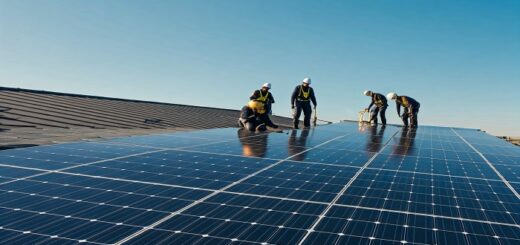Complete Guide to Solar Panel Systems in Nebraska

Complete Guide to Solar Panel Systems in Nebraska
Solar energy is becoming a popular choice in Nebraska. The state has ample sunlight and many benefits for homeowners. If you are thinking about installing a solar panel system, this guide is for you. We will cover everything you need to know, from how solar panels work to their benefits, costs, and installation process. Complete Guide to Solar Panel Systems in Nebraska.
What Are Solar Panels?
Solar panels convert sunlight into electricity. They consist of many solar cells that work together. When sunlight hits these cells, they create direct current (DC) electricity. An inverter then converts this DC electricity into alternating current (AC) electricity, which is used in homes.
Why Choose Solar Energy in Nebraska?
Nebraska has about 300 sunny days each year. This makes it ideal for solar power. Here are some reasons to consider solar energy:
1. Environmental Benefits
Solar energy is clean. It does not produce greenhouse gases. By installing solar panels, you can reduce your carbon footprint. Solar energy helps combat climate change.
2. Cost Savings
Solar panels can help you save money on your energy bills. Once installed, they provide free electricity for many years. Many homeowners see a return on investment in a few years.
3. Energy Independence
With solar panels, you depend less on your utility company. You generate your own electricity. This can be especially important during power outages or rising energy prices.
4. State Incentives
Nebraska offers various incentives for solar energy. This includes tax credits and rebates. These can lower the installation costs significantly.
How Solar Panels Work
Solar panels function through the following steps:
- Absorption of Sunlight: Solar cells absorb sunlight. The cells are made of silicon, which helps create an electric field.
- Generation of Electricity: When sunlight hits the cells, it knocks electrons loose. This creates a flow of electricity.
- Conversion to Usable Power: The generated DC electricity flows to an inverter. The inverter converts it to AC electricity, suitable for home use.
- Powering Your Home: The AC electricity is used to power your lights, appliances, and more.
- Net Metering: If you produce more electricity than you use, excess energy can be sent back to the grid. This can earn you credits on your utility bill.
Types of Solar Panel Systems
When considering solar panels, there are several types to choose from:
1. Grid-Tied Systems
These are the most common systems. They connect to the utility grid. You benefit from net metering. If your solar panels produce more energy than you use, the excess is sent back to the grid. You earn credit for this excess power.
2. Off-Grid Systems
These systems are not connected to the grid. They are perfect for remote areas. Off-grid systems require battery storage to store excess energy. This ensures you have power even when the sun isn’t shining.
3. Hybrid Systems
Hybrid systems combine both grid-tied and off-grid. They connect to the grid but also store energy in batteries. This provides the flexibility of using grid power and having a backup supply.
How Much Do Solar Panels Cost in Nebraska?
The cost of solar panels in Nebraska can vary. On average, homeowners spend between $15,000 to $25,000 for a residential solar installation. This depends on factors like the system size and the type of equipment.
Factors Affecting Solar Panel Costs
- System Size: Larger systems generate more electricity but cost more to install.
- Type of Panels: High-efficiency panels may be more expensive but can provide more power.
- Installation Costs: Labor costs can vary by region. Hire qualified installers to ensure proper setup.
- Permits and Fees: Local regulations may require permits, adding to the total cost.
Financing Options
There are several ways to finance solar panel installation in Nebraska:
- Cash Purchase: Pay for the system upfront. You will own it outright.
- Solar Loans: Some banks and credit unions offer loans. This helps spread the cost over time.
- Leases: Some solar companies offer leases. You pay a monthly fee to use the system.
- Power Purchase Agreements (PPAs): You pay for the electricity produced, usually at a lower rate than your utility.
Incentives and Tax Credits in Nebraska
Nebraska offers several incentives to reduce the cost of solar installation:
1. Federal Investment Tax Credit (ITC)
Homeowners can deduct 30% of the installation cost from their federal taxes. This incentive is helpful for reducing overall expenses.
2. State Solar Tax Credit
Nebraska has its own tax credit. It allows homeowners to receive a credit based on up to 25% of their solar installation costs.
3. Local Incentives
Some cities or utilities in Nebraska may offer additional rebates or incentives. Check with your local utility provider to learn about possible programs.
Installing Solar Panels in Nebraska
1. Choose a Solar Provider
Start by researching solar providers in Nebraska. Look for:
- Experience and reputation
- Customer reviews
- Range of services offered
2. Schedule a Consultation
Most solar companies offer free consultations. They will evaluate your home and energy needs. During this consultation, they may:
- Assess your roof’s condition
- Determine how much solar you can install
- Provide cost estimates and financing options
3. Review Contracts
Before signing anything, thoroughly review contracts. Make sure you understand all terms and conditions. Look for hidden fees and warranties.
4. Installation Process
Once you select a provider, the installation process begins. This typically involves:
- Obtaining necessary permits
- Installing the solar panels and inverter
- Connecting to the grid (if applicable)
- Final inspections to ensure everything meets local codes
5. Enjoy Your Solar Power
After installation, you can start generating your own electricity. Monitor your system’s performance to ensure it’s working correctly.
Read More: Solar Panel System in Indiana
Maintenance of Solar Panel Systems
Solar panels require minimal maintenance. Here are some tips:
1. Clean the Panels
Dust, leaves, and snow can reduce efficiency. Clean panels as needed, especially in the spring and fall.
2. Monitor Performance
Most solar systems come with monitoring tools. Regularly check your system’s output. If you notice any issues, contact your provider.
3. Schedule Professional Inspections
It’s wise to have a professional inspect your system every few years. They can identify potential problems and ensure optimal performance.
Common Misconceptions about Solar Energy
1. Solar Panels Don’t Work in Winter
Many believe solar panels are useless in winter. This is false. They can generate electricity even on cloudy days. Cold temperatures improve their efficiency.
2. Solar Energy is Too Expensive
While the upfront cost can be high, many financial incentives lower the final price. Over time, savings on energy bills offset installation costs.
3. Solar Panels Require Constant Maintenance
Solar panels are low maintenance. A simple cleaning and occasional inspections are usually enough.
Conclusion
A solar panel system in Nebraska is a smart investment. It provides environmental benefits, savings on utility bills, and energy independence. With ample sunlight and various incentives, now is the time to consider solar energy for your home.
Make informed choices when selecting a solar provider and system. Understand the costs, financing options, and installation process. Enjoy the benefits of clean energy for years to come. Embrace the power of the sun and take a step toward a sustainable future.
Solar energy is brightening Nebraska. Are you ready to join the movement?
Complete Guide to Solar Panel Systems in Nebraska.
Complete Guide to Solar Panel Systems in Nebraska


















1 Response
[…] Read More: Complete Guide to Solar Panel Systems in Nebraska […]